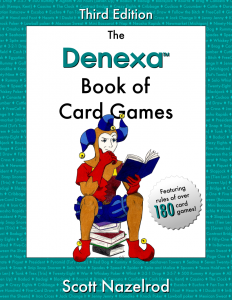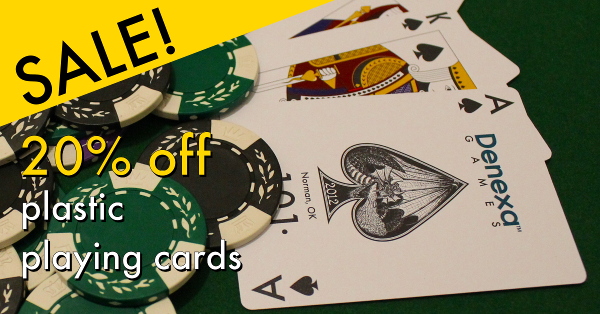Last One
Last One is a variant of Crazy Eights for two to six players. Like other Crazy Eights variants, Last One takes the base gameplay of its parent game and adds additional cards beyond 8s that have special effects. It also incorporates a scoring system, allowing the game to go on beyond a single hand. Last One dates back to at least the 1970s, having been reported then being played in Maine.
Object of Last One
The object of Last One is to be the last one remaining under a certain point threshold. This is achieved by discarding as many cards as possible from your hand.
Setup
To play Last One, you’ll need access to a standard 52-card deck of playing cards with two jokers. If you don’t, do yourself a favor and grab a set of Denexa 100% Plastic Playing Cards. You’ll also need something to keep score with, whether it be the time-honored pencil and paper or something more modern, like a scorekeeping app on a phone.
Shuffle and deal the cards out. The dealer may choose to deal any number of cards for the hand, from four to eight. The dealer may also deal a nine-card hand if there is unanimous agreement among the players. Place the stub in the center of the table, forming the stock. Turn the top card of the stock face up; this card, the upcard, will be the top card of the discard pile.
Game play
The player to the dealer’s left normally goes first, unless the first upcard has a special effect that would change this, as described below. As in Crazy Eights, they must play a card to the discard pile that matches the current upcard in either suit or rank. This card becomes the new upcard. If a player has no cards that they are able or willing to play to the discard pile, they draw one card from the stock and the turn passes to the next player.
When a player is reduced to having one card in their hand, they must call out “last one”. If they fail to do so by the time the next person plays, they draw two cards from the stock as a penalty.
When the stock is depleted, set aside the current upcard and shuffle the remainder of the discard pile, turning it face down to start a new stock.
Special card effects
Almost half of the cards in the deck have some special effect that happens when they are played. The only cards that do not are 5s–7s, 9s, 10s, queens, and kings.
2s
The next player must draw two cards and their turn is skipped.
3s
After playing a 3, a player may stack any additional card on top of it, essentially giving them a free play. This stacked card becomes the new upcard.
4s
Playing a 4 starts a run of plays called a melee. The player who discarded the 4 is the aggressor and the next player in turn becomes the defender. If anyone holds the 5 of the same suit as the 4, they may play it. In so doing, they become the new aggressor and the previous aggressor becomes the defender. This continues, with anyone holding the 6 of the appropriate suit being able to play it and becoming the new aggressor, and so on. If a player does not play, the most recent defender draws a number of cards equal to the pip value of the last card played. Play then continues as normal, starting with the player in turn order after the defender.
8s
An 8 may be played at any time. The player who plays it names any one of the four suits, with the next player required to play a card of that suit, or switch suits with another 8.
Jacks
The next player in turn is skipped.
Aces
The turn of play reverses direction. If, before the ace was played, play was proceeding to the left, it now proceeds to the right, and vice-versa.
Jokers
A joker can represent any natural card in the deck, as chosen by the person who plays it. The next player must continue with a card of the same rank or suit as the card named.
Ending the hand
The hand ends when a player runs out of cards. That player, as well as any other player who holds only one card, scores zero for the hand. All other players total up the values of the cards in their hand, with jokers worth 40 points, 8s worth 25, aces worth 15, face cards worth 10 each, and all other cards worth their pip value. The total arrived at is added to their score.
The deal then passes to the left. When players reach a predetermined score threshold (such as 250 points), they drop out of play, sitting out of further hands. Game play continues until only one player is left. That player wins the game.


